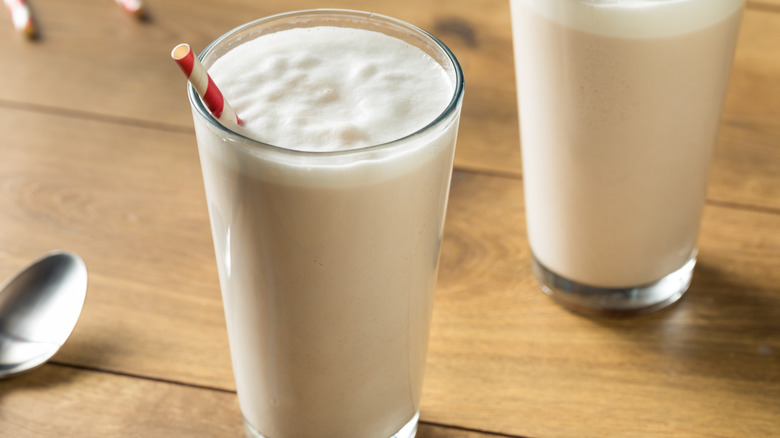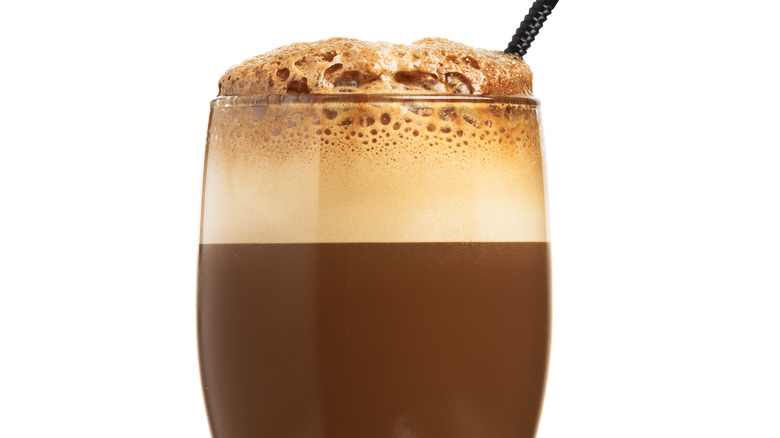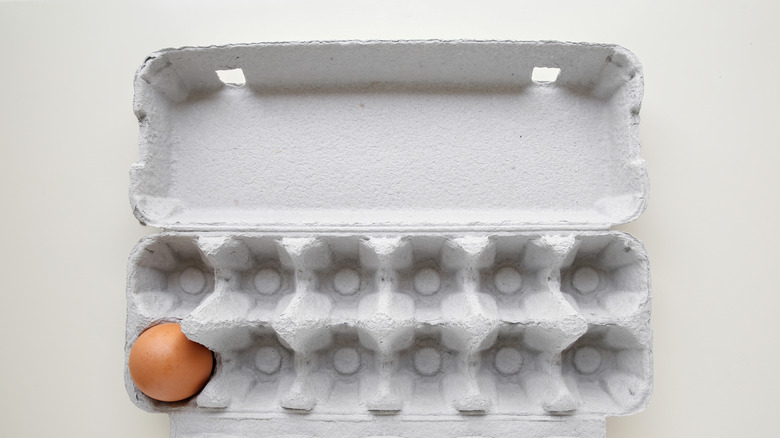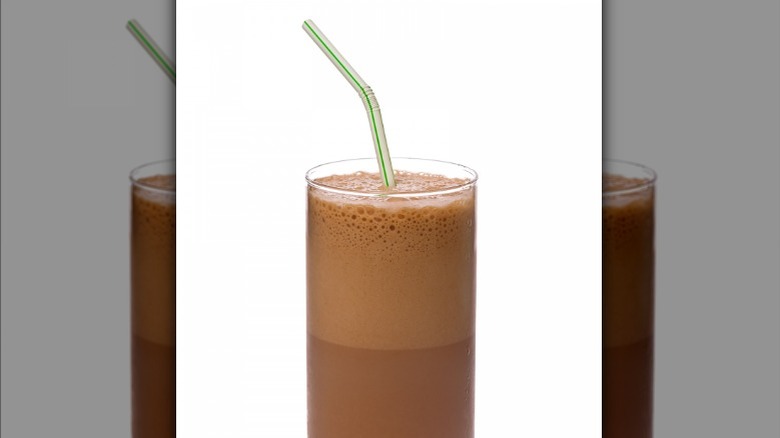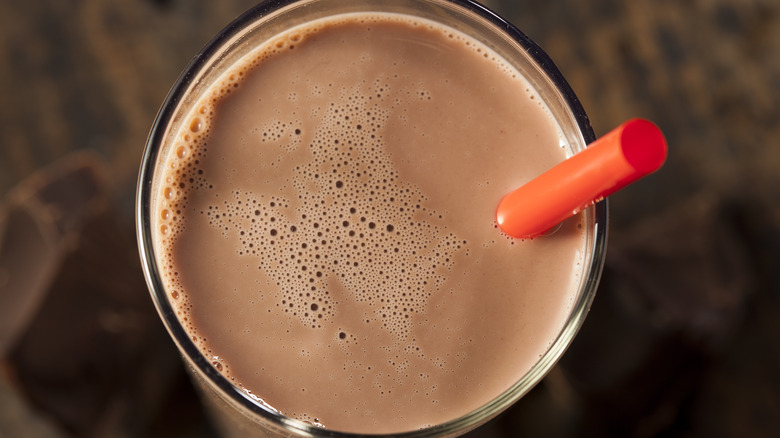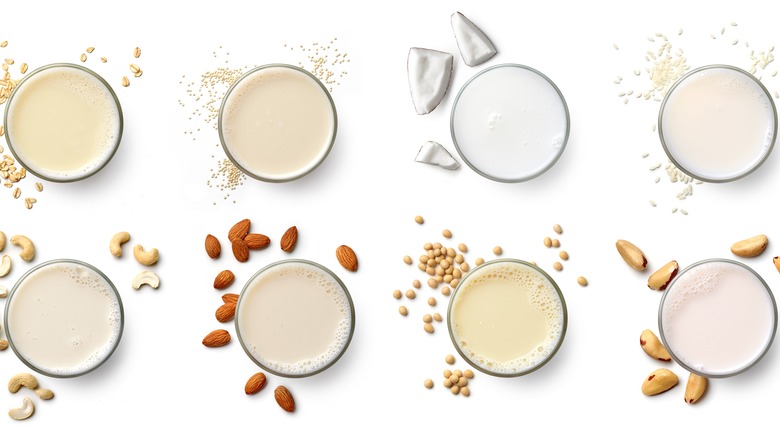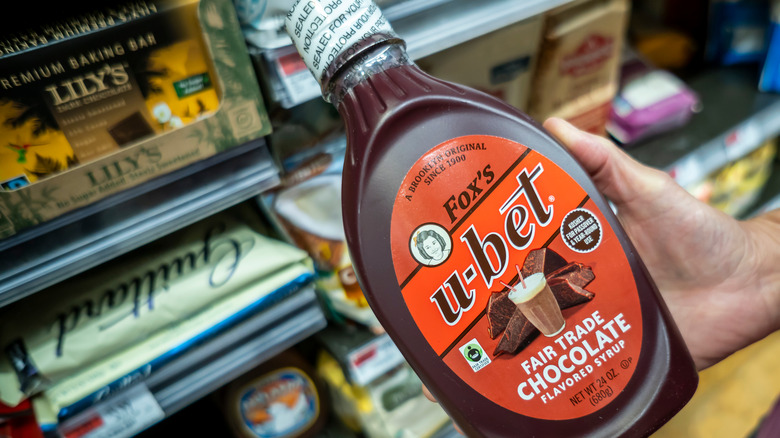What Is An Egg Cream And What Does It Taste Like?
We may receive a commission on purchases made from links.
Unless you live in a city with a decent number of Jewish delis or have been to any of the establishments trying to revitalize the old-fashioned soda fountain, you've likely never heard of an egg cream. Arising out of the Ashkenazi Jewish immigrant community in New York, the egg cream became a cultural touchstone that spread across the United States wherever their descendants resettled. Today, it's a beloved piece of culinary nostalgia for many parts of the American Jewish diaspora, but its cultural impact has popped up in surprising places. Martin Sheen's President Bartlett fell in love with the drink on "The West Wing". A lightbulb-headed robot served them on "Hey Arnold!". There's an indie documentary short about them. The residents of Sesame Street used them to teach kids about memory and grief. And you will never guess which rock star wrote a song praising them.
The egg cream is an idiosyncratic drink. It has a proud history, but humble origins. It's incredibly simple to make, but there's no shortage of traditionalists telling you there's only one right way to whip one up. It's deeply tied to Jewish identity but has practically nothing to do with Judaism. It's not as decadent as a rich milkshake, nor as crisp as a standard soda. It has a deceptive name, a debated history, and a reputation for being impossible to bottle. So if you're intrigued to try lightning in a frosted glass, here's the story of the egg cream.
What is an egg cream?
Chocolate syrup. Seltzer water. Milk. That's it. It quickly gets more complicated than that, as there are many competing opinions on the proper proportion of ingredients and order of mixing. The fact that the egg cream is essentially carbonated chocolate milk may make you draw a connection to hot cocoa, but the egg cream is always served cold, the colder the better. The egg cream sits in the same general niche as the other dessert drinks on the menu of an old-fashioned soda fountain like milkshakes and malts.
The seltzer water gives egg creams an effervescence that was extremely popular in the Jewish communities that birthed the drink, giving it a characteristic frothy head and a sense of fanciness that working-class Jews turned to as a taste of how the other half lives. Flavor-wise, the egg cream is sweet and rich enough to feel like an indulgence, but cool and refreshing enough that legend has it one of its purported creators would sell 12,000 of them on a hot day.
Egg cream has storied (and debated) history
It's agreed that the egg cream got its start in New York City but beyond that, its origins are a matter of debated oral history. Carbonated water became a hit in New York when the Tontine Coffee House on Wall Street installed its version of a mechanical carbonator in 1809. By the 1890s soda fountains were commonplace across the U.S. and adding flavored syrup to carbonated water was common practice.
But from there, the narratives diverge. An egg cream-like drink is popular in the Soviet Republic of Georgia, suggesting that the egg cream may have come to New York fully formed with immigrants from the Soviet Union. Louis Auster, owner of a candy store on Manhattan's Lower East Side is commonly credited as the inventor, perhaps with the help of Boris Thomashefsky. Born in Ukraine, a star of the Yiddish Theater, Thomashefsky allegedly returned from a stint in Paris and attempted to order the chocolat et crème he'd enjoyed there at his favorite soda fountain. After some improvisation by Auster, Boris became the first man in America to sample an egg cream.
The sociologist Daniel Bell, however, gave a different story. The late Harvard professor attested that his own Uncle Hymie invented the egg cream at his Second Avenue candy shop. Hymie's original did include both eggs and cream, but undercutting competitors stripped out the expensive ingredients for a cheaper concoction that made Hymie's richer drink economically unviable.
It doesn't actually include eggs
Good news for those seeing egg prices yo-yo: Whether or not the modern egg cream descended from a drink that originally included eggs, it's lost the ingredient over time. Theories as to why the inaccurate name stuck are as varied as the competing narratives of the drink's origins. The proposition that the egg cream came from Jewish expats from the Russian Empire does dovetail with the theory that the name was originally "echt cream" from the Yiddish word for "pure," "genuine," or "real." Food historian Andrew F. Smith backs the "cheaper alternative" theory which credits the invention to trying to produce a rich chocolate soda without the eggs that had thickened and fortified the original drink.
The story of Boris Thomashefsky's return from France, like the "echt cream" theory, credits the name to a loss in translation. The name of the French drink, "chocolat et crème," was morphed by Yiddish accents and landed at the English "chocolate egg cream." Daniel Bell's version also includes an ancestor drink with eggs mixed in, owing to raw eggs being pitched as a superfood by Dr. Benjamin Dubovsky, the Jewish Daily Forward's medical columnist at the time. Bell does in fact give the original drink a name: the egg malted. He says it was a compromise between a sweet drink that would appeal to young boys and a mother-approved nutritious snack. How's that for a scoop of protein in your smoothie?
It's all about the ratios
Just like there are competing stories of who made the egg cream, there are competing versions of how to make it right. Fans who grew up with the concoction know that an egg cream can either be made perfectly or confoundingly badly. A watery egg cream with too much seltzer would obviously be unappealing, but an excess of chocolate syrup leaves the drink too thick and sugar-laden. Too much milk meanwhile, cuts down on that crisp effervescence and robs the egg cream of its distinctive, foamy head.
Gold's Brand, the company now in possession of the chocolate syrup manufacturer Fox's U-Bet, presents its own quasi-recipe that abides by old-school saloon portioning measurements: Go by the height of the liquid in the glass. Measure one inch of syrup to two-to-three inches of milk and top the rest of the glass with seltzer. Even the head of the egg cream is open to scrutiny and debate; some favor a brown head formed from the seltzer being introduced after the milk and chocolate are mixed while others prefer the white head that comes from the seltzer and milk interacting first. The brown vs. white head debate has even been attributed to different boroughs of New York. Food and travel columnists Michael and Jane Stern even determined the optimal head-to-liquid ratio in the 1980s: one-third foam, two-thirds liquid.
What does an egg cream taste like?
Despite its former popularity, chocolate is not the favorite soda flavor in the U.S. After the downfall of the traditional soda fountain, there was a brief spark of a chocolate soda craze in the 1980s that coincided with the rise of aspartame as an artificial sweetener. Chocolate is naturally bitter and owes its popularity among Americans to it being combined with a lot of sugar. Most of those Reagan-era chocolate sodas were diet varieties that were sweetened with aspartame and arguably owed much of their marketability to their "guilt-free" qualities. Today, bubbly chocolate drinks are a niche novelty.
The egg cream has its work cut out for it to win over modern soda fans. Its flavor is, above all, fragile. It famously has to be consumed soon after preparation before the fizz dies and the ingredients separate. Fox's U-Bet brand syrup is indispensable because it has a subtler sweetness than a brand like Hershey's and lets the milk and seltzer bring out the chocolate flavor without it becoming cloying or saccharine. The Sterns mentioned above compared egg creams to Champagne, and that comparison is more apt than you may think. There are plenty of wrong ways to make an egg cream, but the right ways all promise a bubbly crispness, a light sweetness, a slightly creamy mouthfeel, and just a hint of a mineral bite, which are some of the same qualities you'll find in a good Champagne.
They're impossible to bottle
The lipids in milk go together with bubbling seltzer like, well, oil and water. Part of the reason the egg cream hasn't enjoyed the ubiquity of your usual colas is that it is hard to make shelf-stable. Any soda will eventually lose carbonation to seepage eventually, but none of the ingredients making them up are prone to outright curdling. The U.S. dairy lobby advises that even pasteurized milk should not be left unrefrigerated for more than two hours. Soft drinks sit on unrefrigerated shelves at your local grocer for days.
But a noble attempt was once made by Egg Cream America., the producers of Jeff's Sodas. Offering flavors like chocolate, vanilla, berry, orange cream, and even root beer float and coffee varieties, the company once boasted that it had created a whole new market of dairy-based carbonated beverages. The results were seemingly mixed: One reviewer enjoyed Jeff's Chocolate Soda and Orange Dream but was skeptical of the rest of the line. Weird Soda Reviews said it was lumpy and that the carbonation gave it a slightly citrusy taste. Today, the brand's website at the evocative domain "GetCreamed.com" is now defunct, and the Amazon product reviews indicate that nobody has had Jeff's Soda since the mid 2010s. Today, instead of pre-bottled egg creams, you can buy an at-home egg cream kit that includes a seltzer bottle with a spigot to get the high-pressure blast of fizzy water that gives an egg cream the perfect head.
They're surprisingly easy to turn vegan
With something as chemically and culinarily temperamental as the egg cream, one would think there would be some great hurdle to making this confection totally plant-based. Vegans can count their lucky stars that the egg is only in the name, vegan chocolate syrups are easy to come by, and plant-based milk substitutes are surprisingly up to the task of filling dairy's role in the egg cream. You can make vegan chocolate syrup at home, and vegan coffee creamer can stand in for the milk. These two ingredients are especially dense, so this vegan egg cream should be made with a higher percentage of seltzer than the typical variety to achieve the proper texture.
Meanwhile, Go Dairy Free has a recipe that pays homage to the egg cream's typical menu mate: the ice cream float. Go Dairy Free's variant includes perfectlyfree brand plant-based chocolate-dipped vanilla ice cream bites to add thickness and allows for whatever milk substitute your heart desires, but it does require a blender to make properly.
Can egg creams be diabetic or keto-friendly?
We already mentioned how chocolate sodas had their boom because of a new artificial sweetener, and for those looking to cut sugar for either the overall health benefits or to fit into a particular diet, noncaloric sweeteners are tempting options that are becoming increasingly common. They're not without their risks though, as a study in Nature Medicine has shined a light on a correlation between the popular noncaloric sugar alcohol erythritol and an increased risk of stroke and cardiac illness. Sucralose meanwhile, has so far had a cleaner track record of long term safety. Egg cream purists can rejoice since Fox's U-Bet's sugar-free alternative to its famed chocolate syrup is sucralose-based.
As for cutting down on the natural sugars in milk, heavy cream is a common staple for ketogenic recipes. Swapping whole milk out for heavy cream increases the fat content by a factor of 9, meaning that any attempt at a keto egg cream would be best approached like the aforementioned vegan creamer-based option: Use more seltzer to cut down the thickness.
There's a right choice of syrup and it's Fox's U-Bet
You've likely noticed the prevalence of Fox's U-Bet chocolate syrup in the story of the egg cream. Started in 1900, the Brooklyn-born brand is so tied to what makes an authentic egg cream in the American imagination that there's a picture of an egg cream on every bottle's label. Fox's is deeply tied to New York Jewish American identity; grocery stores and suppliers sometimes categorize their product in the ethnic foods section with the matzoh balls and Kedem wine, not simply with the other chocolate syrups. The brand offers varieties certified both kosher for Passover and pareve by The Orthodox Union, making it available for even the most religiously observant Jews. It proudly advertises its lack of high-fructose corn syrup, making it stand out to those skeptical of the industrial sweetener.
And of course, what's a New York institution without a mafia connection? Yes, Fox's U-Bet was mobbed up. A would-be crime boss by the name of Harry Dolowich briefly ran a racketeered oligopoly of the major New York soda syrup brands, crushing competition and controlling prices. Founder and owner Herman Fox fell in line with the law student-turned-gangster and managed to survive the breakup of Dolowich's miniature empire. Fox's U-Bet is now owned by Gold's Pure Foods, another company founded by a Brooklyn Jewish family, keeping it safe from any more "legitimate businessmen."
Wait, Lou Reed wrote a song about egg creams?
Yes. Yes he did. "Egg Cream," the starter track on his 1996 album "Set the Twilight Reeling," is not a venerated landmark of pop music history like his solo singles "Walk on the Wild Side" or "Satellite of Love," nevermind the Andy Warhol-produced debut of his band, "The Velvet Underground & Nico". But the legendary art-rocker's ode to the poor man's ice cream float is a testament to what's kept the drink on people's minds: identity and nostalgia. He gives a shout-out to Fox's U-Bet, he names his favorite childhood haunts where he drank egg creams, and in the vulnerable penultimate verse, he finds the root of his love for the concoction with brilliant simplicity, singing "The only good thing I remember about P.S. 92/Was the egg cream served at Becky's...That made it easier to deal with knife fights/And kids pissing in the street."
It probably comes as no surprise that Reed came from a family of Russian Jewish immigrants to New York. While it's not the popular institution it was in the days when soda jerks were on hand to fill your order, the egg cream persists to the extent that it does because of its emergence from a displaced community in hard circumstances trying to find joy and comfort when very little luxury could be attained. It's decadence on a shoestring budget, an urban working-class dessert with upper-class affectations. But remember: It's bubbly chocolate milk, let's not go overboard.
